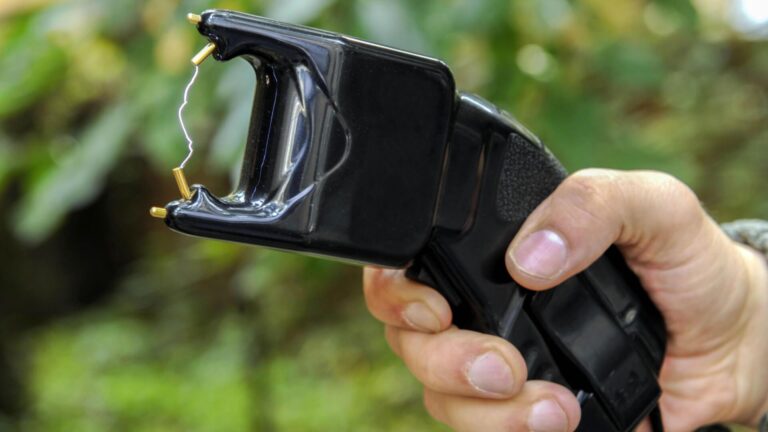Table of Contents
- Legal Framework Governing Non-Lethal Weapons in Pennsylvania
- Permissible Types and Their Authorized Usage
- Navigating Restrictions and Compliance for Personal Use
- Best Practices for Safe and Responsible Handling
- Final Thoughts
Legal Framework Governing Non-Lethal Weapons in Pennsylvania
In Pennsylvania, the use and possession of non-lethal weapons such as pepper spray, stun guns, and tasers are regulated under specific statutes designed to balance public safety with individual rights. The state permits adults to carry these defensive tools, but restrictions exist regarding their sale to minors and their use in sensitive locations such as schools or government buildings. Understanding these regulations is crucial for lawful ownership and use. For instance, while pepper spray is generally permitted, it cannot be used offensively or with intent to cause harm beyond self-defense. Additionally, some municipalities may have added local ordinances that further refine these state laws.
Key legal considerations include:
- Age restrictions typically require users to be 18 years or older.
- Prohibition of use on certain individuals such as law enforcement officers unless in self-defense.
- Limitations on carrying non-lethal weapons in schools, courthouses, and other sensitive environments.
- Mandatory compliance with safe handling and storage protocols to prevent misuse or accidental discharge.
To stay compliant, Pennsylvania residents are encouraged to consult local laws alongside state statutes and seek training on the proper use of their non-lethal weapons. This ensures not only personal protection but also adherence to the legal frameworks that govern responsible self-defense within the Commonwealth.
Permissible Types and Their Authorized Usage
In Pennsylvania, the use of non-lethal weapons is strictly regulated to balance personal safety with public responsibility. Among the most commonly authorized types are pepper spray and stun guns, both considered viable options for self-defense. Pepper spray must meet specific chemical concentration standards and is allowed primarily for protection against human attackers. Similarly, stun guns may be carried lawfully only by individuals 18 years or older without the need for special permits, provided their use is strictly for self-defense and not for offensive purposes.
Key authorized non-lethal weapons include:
- Pepper Spray: Limited to sizes containing less than 2 ounces of chemical substance.
- Stun Guns/Tasers: Permitted without special licenses, but illegal in certain sensitive locations such as schools or courthouses.
- Personal Safety Alarms: Allowed without restrictions and often recommended for additional security.
Navigating Restrictions and Compliance for Personal Use
When considering non-lethal weapons for personal use in Pennsylvania, it’s essential to stay informed about the state’s legal framework to avoid inadvertent violations. These tools, while designed to incapacitate rather than harm lethally, are often subject to specific restrictions based on their type, possession, and intended use. Pennsylvania law differentiates between devices such as pepper spray, stun guns, and other self-defense tools, each governed by unique regulations aimed at balancing public safety with individual rights. For example, the purchase and carrying of pepper spray generally require no special permits, but misuse or possession by minors can trigger legal consequences.
To ensure compliance, Pennsylvania residents should:
- Verify age requirements: Most non-lethal weapons can only be legally owned by individuals aged 18 or older.
- Understand carry laws: Some non-lethal devices might be restricted when carried in certain public places or government buildings.
- Check use limitations: Self-defense tools must be used strictly in situations of legitimate personal protection; misuse can result in criminal charges.
- Stay updated: Laws regarding non-lethal weapons can evolve, so regular review of state statutes and local ordinances is advised.
Best Practices for Safe and Responsible Handling
When handling non-lethal weapons, it is essential to prioritize safety and responsibility at all times. Always ensure the device is kept unloaded and secured when not in active use, preventing accidental discharge. Familiarize yourself with the manufacturer’s instructions and local regulations, as Pennsylvania laws may have specific guidelines regarding storage, transportation, and use. Regular training and practice sessions can enhance your confidence and competence, reducing the risk of misuse or injury. Remember to treat every encounter involving these tools with the utmost seriousness, ensuring conflict de-escalation remains your primary focus.
Adopting clear protocols can further enhance responsible ownership. Consider implementing these best practices:
- Perform routine checks on your equipment to maintain functionality and safety features.
- Keep non-lethal weapons out of children’s reach and inform household members about their presence and potential risks.
- Use only in situations where there is a legitimate threat, understanding that these tools are designed to subdue-not injure seriously.
- Document any use in a detailed manner, especially if legal or self-defense claims may arise.
By embracing these principles, you uphold both the spirit and letter of Pennsylvania’s legal framework, promoting public safety while protecting your rights.
Final Thoughts
In conclusion, navigating the legal landscape surrounding non-lethal weapons in Pennsylvania requires a clear understanding of state-specific regulations and restrictions. Whether you’re considering carrying pepper spray, stun guns, or other defensive tools, staying informed about the laws ensures not only your safety but also your compliance with the law. Always consult with legal professionals or trusted resources before making decisions, and remember that responsible use and training are key to effectively protecting yourself without crossing legal boundaries. Stay safe and empowered by knowing your rights and obligations when it comes to non-lethal self-defense in Pennsylvania.Check Our Other Blogs
- StunGun – Your Trusted Source for Stun Guns, Laws, and Self-Defense Tips
- PepperSprayLaws – Your Trusted Resource for Pepper Spray Information
- StunGunLaws – Your Trusted Guide to Stun Gun Legality and Safety



